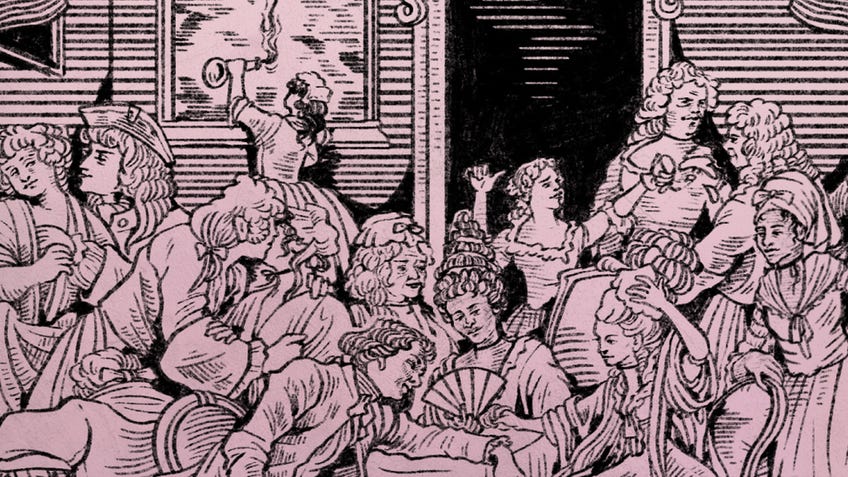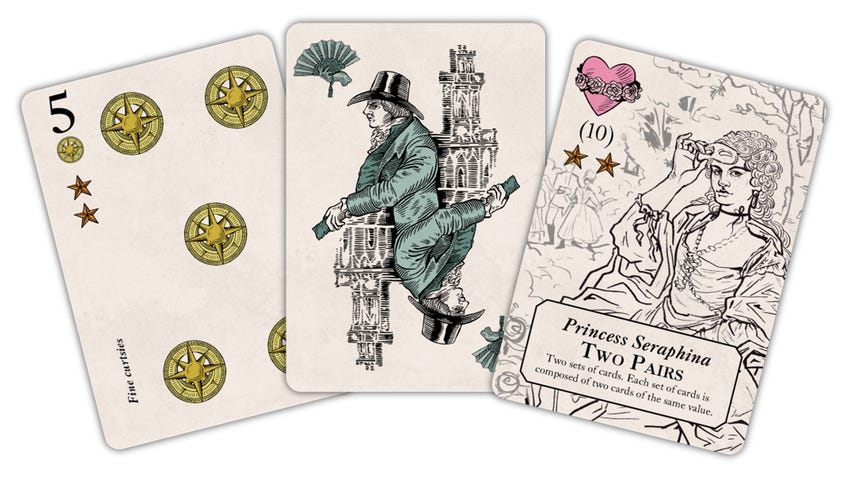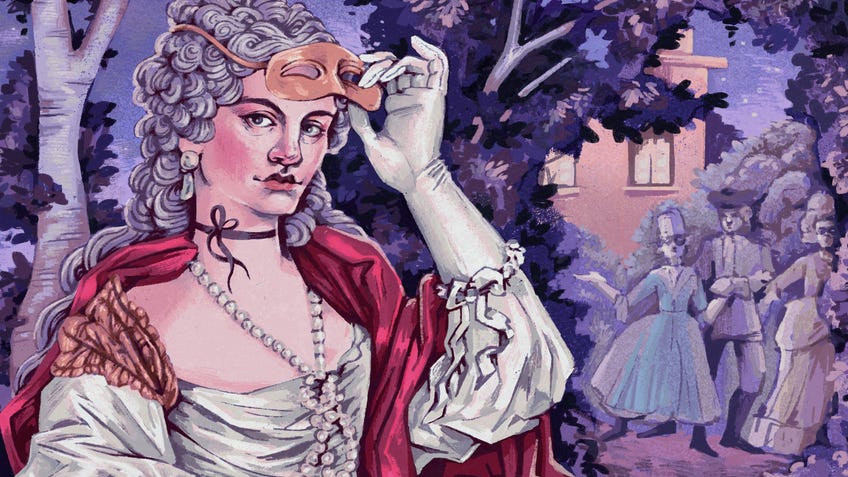Molly House tells a compelling story of individual vice and queer community with risk-versus-reward gameplay
Throw some period drama parties.
Shortlisted for the 2021 Zenobia Award – which serves to highlight underrepresented voices within the historical board game community – Molly House is a game that tells the story of the LGBTQ+ community in London during the 18th century.
Designed by Jo Kelly, Molly House focuses on the titular Mother Clap’s Molly House and its guests, many of whom gathered to hold parties for local queer people who wanted somewhere that seemed to be somewhat safe from vigilante investigators for the Society of the Reformation of Manners – a outwardly homophobic organisation that dragged many innocent LGBTQ+ people into court, prison and often worse.
Dicebreaker was able to experience an early overview of the upcoming board game with creator Kelly and Cole Wehrle, Root designer and co-founder of Wehrlegig Games - the publisher set to release Molly House after its successful Backerkit crowdfunding campaign in October. Though the core design of Molly House is about “75% complete,” according to Wehrle, there are still elements of its gameplay that remain in flux, meaning that the version we played was not finalised.

Molly House sees players attempting to score victory points by playing cards during parties hosted at Mother Clap’s Molly House. Players can collect cards by visiting the various spaces on the board such as Covent Garden, which allows you to pick available face-up cards from the market.
The opportunity to score points and collaborate makes the molly house parties stand out as bastions of joy.
Picking up cards will enable players to devise strategies to score points during the parties at the molly house, but they’ll need an actual molly card to trigger one. Each molly card includes a goal for players to achieve whenever it’s used for a party at Mother Clap’s - for example, play three pairs of cards with matching numbers - with everyone who participates scoring victory points if their cards are used to achieve the goal. Playing cards that match the suit of the active molly card and/or cards in a suit that’s currently ranked higher on the reputation track will net the player even more points.
Trips to Mother Clap’s feel like they’re the event of the social season. Getting all the players involved and making it an almost semi-co-operative moment in an otherwise competitive game echoes the drama of a party – with all the guests coming together under one roof with their own specific agendas. The opportunity to score points and collaborate makes the molly house parties stand out as bastions of joy in an otherwise uncertain battle for cards that serves as the bulk of the game.
Players can choose to use a higher-numbered card to play towards the party goal in the hopes of it being scored. The higher the number, the more joy - victory points - a card will net you. However, cards need to actively contribute to the goal to be scored, with any left being added to the gossip pile – as if your advances towards someone at the party have not been returned. At the end of every round, cards are drawn from the gossip pile to fill up the market spaces. The remaining gossip cards will either be discarded, if numbered under four, or result in Mother Clap’s Molly House itching closer to being closed if their value is higher.
As to be expected, the only people who benefit from the closure of the molly house are the members of the Society of the Reformation of Manners and their associates. Whenever players receive a guilt chip – which happens when a constable card is revealed - there’s a chance that it’ll be an invitation to become an informant for the society. The player can choose to reveal this chip before discarding it or can keep it and become a secret traitor against their fellow molly house guests. Choosing this path will mean that this player can only win if the molly house is closed and they have the most victory points.
For some players betrayal might seem like the only way for them to win.
Forcing players who choose to help the Society of the Reformation of Manners into a separate avenue to victory makes it feel like a weighty choice that will ostracise them from their former friends and companions. However, for some players – depending on the hand they’ve been dealt throughout the game – it might seem like the only way for them to win, which is an excellent way of reflecting the difficult potential decisions some queer people may have been forced to make to survive during the 1700s.

If the others ever suspect one of their fellow players is an informant, they can levy an accusation at them and choose one of their guilt chip piles to investigate. Correct accusations will result in that player becoming a known informer and outsider, meaning that they cannot attend a molly house party unless they’re specifically invited by another. Suspicions can arise when a player regularly plays high cards that don’t end up contributing to a molly house party goal – and therefore end up in the gossip pile – or if they’re especially brazen about the number of cards they’re drawing from the deck or market.
Whilst drawing cards is essential to playing Molly House, it is also intimately tied with its central gameplay mechanic of risk-versus-reward. Besides number cards and molly cards, the deck also contains constable cards that will get players into trouble with the Society of the Reformation of Manners whenever they’re drawn.
The Catch-22 situation players find themselves in does a fantastic job of illustrating the dangerous situation many queer people found themselves in.
Each of the four card suits in Molly House has two constables that trigger arrests if they’re revealed. Whenever the first constable of a suit type is drawn the player who holds the highest-numbered card of that suit in their hand is arrested – meaning that they must take a guilt chip, which act as minus points, or discard the card. The second constable of a suit type being revealed results in whichever player who has the highest card total of that type in their hand getting arrested, having to either discard all cards matching the suit or take that number of guilt chips.
Informant players can choose to lie about what they have in their hand to avoid getting arrested. However, there are actions players can perform that either force themselves or others to reveal their hand – increasing the risk of accusations if they do.
The Catch-22 situation players find themselves in during Molly House – that they need to search through a deck filled with constables to find the cards they need to score points – does a fantastic job of illustrating the dangerous situation many queer people undoubtedly found themselves in living in 18th Century London, with the fundamental need for community and love being threatened by the risk of persecution.
Players are forced to balance their search for joy against the fear of repercussions.
Of course, players can choose to return to their homes, or starting spaces, at any point in the round but they’ll be unable to perform any actions besides drawing a single card from the deck. It might seem like a poor decision to return home too soon, but not being out means no visits from the constables and no repercussions for the final constable card of the round being revealed – which results in all cards matching the suit, including those in a player’s scoring pile, being counted towards guilt chips.

Collecting certain cards – such as mollies or cards that work towards a molly card goal – will help players to score the victory points they need to win. However, taking too many risks around London or the molly house could result in the closure of the one avenue that most of them will have to gain points.
Players are forced to balance their search for joy against the fear of repercussions in a board game that manages to effectively communicate its ideas almost entirely through gameplay. Molly House does an excellent job of telling the story of a community of queers trying to find connection and happiness under the oppression of a hostile organisation in power – particularly through the deeply unfair and difficult decisions the players are forced to make. This is the kind of board game that utilises the unique elements of tabletop to tell an important story in a way that only this form of entertainment can.


